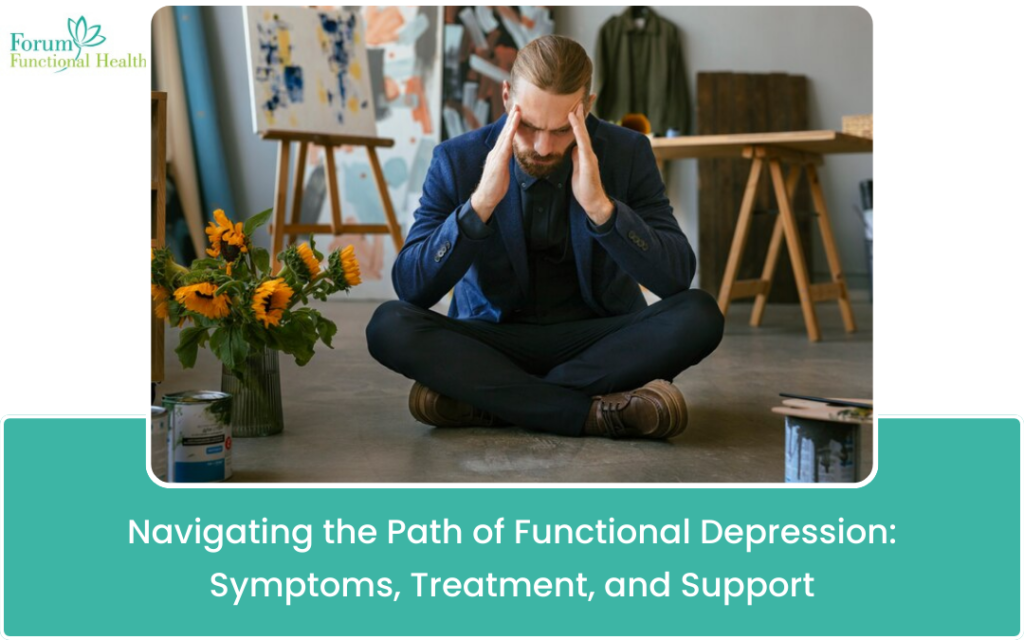Navigating the Path of Functional Depression: Symptoms, Treatment, and Support

Functional depression, often characterized by a persistent feeling of sadness while still maintaining daily responsibilities, is a mental health challenge that many people face. It’s essential to recognize the functional depression symptoms, explore effective treatment options, and understand the support available to those struggling. This guide will help you navigate the complexities of functional depression, fostering a deeper understanding of its signs, treatment approaches, and resources for recovery.
What Is Functional Depression?
Functional depression, sometimes referred to as high-functioning depression, allows individuals to carry out their daily tasks while concealing their emotional struggles. Although they might appear to be managing well, internally they may experience overwhelming sadness, fatigue, and a sense of hopelessness.
Common Signs of Functional Depression
Understanding the signs of functional depression is crucial for early identification and intervention. Here are some common symptoms:
- Chronic Sadness: An ongoing feeling of sadness that doesn’t seem to improve, even during positive experiences.
- Fatigue: A constant sense of tiredness that doesn’t improve with rest.
- Difficulty Concentrating: Trouble focusing on tasks, leading to decreased productivity at work or home.
- Emotional Numbness: A lack of interest or pleasure in activities once enjoyed.
- Social Withdrawal: Pulling away from friends and family, leading to feelings of isolation.
- Irritability: Increased irritability or mood swings, which can strain relationships.
If you recognize these signs in yourself or someone you care about, it’s crucial to seek help. Resources such as the Functional Health Center in Texas can provide the necessary support.
Effective Treatment Options
Finding the right treatment for functional depression can significantly enhance your quality of life. Here are several approaches that can help:
- Psychotherapy
Psychotherapy, particularly Cognitive Behavioral Therapy (CBT), is often a key component in treating functional depression. CBT helps individuals identify and challenge negative thought patterns, promoting healthier coping mechanisms. This therapeutic approach empowers you to take control of your thoughts and emotions.
- Medication
For some, medication may be necessary to alleviate symptoms. Antidepressants can help balance neurotransmitters in the brain, making it easier to manage feelings of sadness and hopelessness. It’s vital to consult with a healthcare professional to find the most appropriate medication and dosage for your unique situation.
- Lifestyle Changes
Making healthy lifestyle choices can have a significant impact on your mental health. Here are some beneficial strategies:
- Regular Exercise: Physical activity releases endorphins, which can improve mood and overall well-being.
- Balanced Diet: A nutritious diet can positively affect your mental state and provide the energy needed for daily activities.
- Adequate Sleep: Prioritizing sleep hygiene helps improve mood and cognitive function.
- Support Groups
Joining a support group can provide a safe space to share experiences with others who understand what you’re going through. These groups can offer emotional support, encouragement, and coping strategies from peers who share similar challenges.
- Mindfulness and Natural Remedies
Some individuals find relief through mindfulness practices such as meditation, yoga, or deep breathing exercises. Natural supplements, such as St. John’s Wort or omega-3 fatty acids, may also be beneficial, but it’s essential to consult with a healthcare professional before starting any new supplement.
Seeking Help in Texas
If you’re in Texas and are looking for Texas Depression help, the Forum Functional Health Center offers specialized treatment for those dealing with functional depression. Their team is dedicated to providing personalized care and support tailored to individual needs.
- Comprehensive Assessment
At the Forum Functional Health Center, a comprehensive assessment is conducted to understand your unique experiences and challenges. This assessment helps create a customized treatment plan that addresses your specific symptoms and goals.
- Holistic Approach to Treatment
The center adopts a holistic approach, recognizing that mental health is interconnected with physical health. This means your treatment plan may include a combination of therapy, medication, lifestyle changes, and natural remedies to promote overall well-being.
- Ongoing Support and Guidance
Recovery is a journey, and ongoing support is vital. The team at the Forum Functional Health Center provides continuous guidance and encouragement, helping you navigate the ups and downs of recovery. They strive to ensure you feel understood and supported throughout your healing process.
Taking the First Step Toward Recovery
Recognizing functional depression in yourself or a loved one is a significant step toward recovery. It’s important to remember that seeking help is a sign of strength, not weakness. Whether reaching out to a therapist, joining a support group, or exploring treatment options, taking action is essential for healing.
Get the Help You Need
If you or someone you know is experiencing functional depression, don’t hesitate to reach out for assistance. The Forum Functional Health Center provides valuable resources and support for those seeking depression treatment in McKinney, TX. Their team is ready to help you on your journey toward healing.
Conclusion
Navigating the path of functional depression can be daunting, but with the right support and treatment, recovery is possible. By understanding its symptoms, exploring effective treatment options, and connecting with the right resources, you can take charge of your mental health. Remember, you are not alone in this journey, and there is help available. Taking the first step is the beginning of a new chapter in your life. Contact Forum Functional Health in McKinney, TX.
Read More Details: What Are the Best Treatment Options for Female Infertility?
